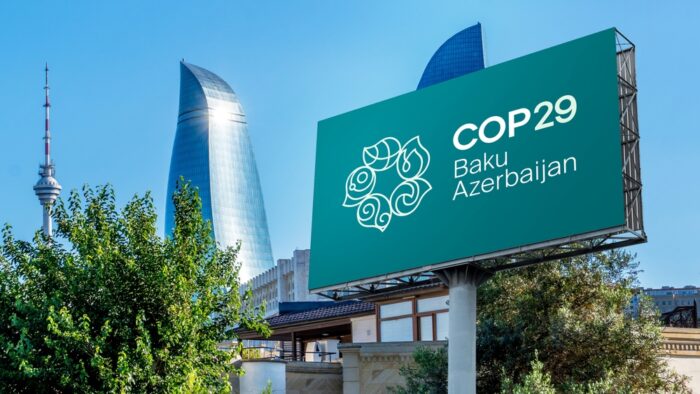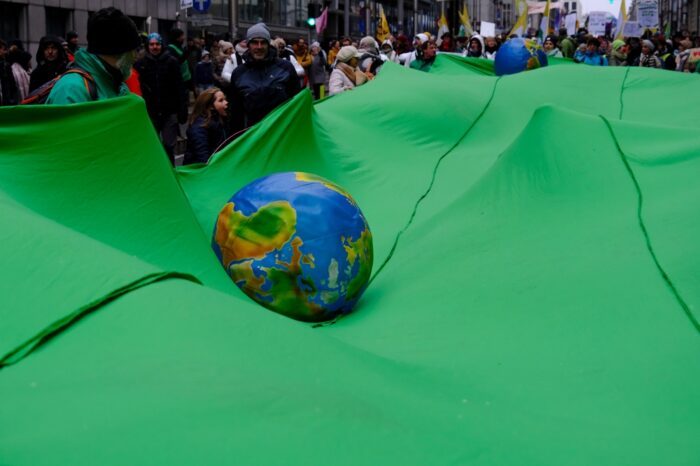Find all related Progressive Post
Progressive Post

Some COPs make history, and other COPs have history done to them. Kyoto in 1997 and Paris in 2015 stand out as history-makers. The 29th meeting of the Conference of Parties (COP) to the UN Climate Convention in Baku, Azerbaijan fits solidly into the latter category.
Unique historical circumstances produced a COP in Azerbaijan: a standoff between the EU and Russia over which country should take Eastern Europe’s turn at hosting the climate talks. Baku was confirmed only when neighbouring Armenia dropped its objections ‘as a sign of good gesture’, announced as part of a package that included the mutual release of captured soldiers. A country hosting a COP bears heavy responsibilities. Its team must set aside the more familiar and easier role of advocating for national positions and facilitate consensus among almost 200 countries to build outcomes that bring the world closer to achieving international climate goals. Masterful French diplomacy made the Paris Agreement possible. Last year’s UAE presidency also helped parties achieve milestone outcomes, notably on transitioning away from fossil fuels.
The COP29 presidency team no doubt did their best, but the tone was set early by the head of state. Azerbaijan’s president lauded his country’s fossil fuel deposits as a ‘gift of god’ and pioneered a novel approach to diplomacy by insulting some of his guests. This caused the French ecological transition minister to cancel her mission to Baku (ministers negotiate the most prominent issues at COP during the second week.) In an unrelated development which contributed to a general sense of the wheels falling off, Argentina’s delegation, already in Baku, was suddenly withdrawn by order of its government.
The COP venue itself – a large stadium – was efficiently organised, as was transport via a fleet of electric buses. At the venue, participants were assisted by a large team of helpful and friendly volunteers. In an unusual but welcome break from standard protocols, solitary white cats could occasionally be seen prowling the corridors and meeting rooms with no less a sense of purpose than their human counterparts.
Trump 2.0
COP29 was haunted by the spectre of the impending Trump administration. Donald Trump has pledged to withdraw the United States from the Paris Agreement, as he did in 2020. This time, a withdrawal would take only one year to effect. His previous administration reneged on US climate finance commitments. Many climate advocates responded to the US election result by claiming that the clean energy transition is inevitable and cannot be reversed by Trump. Well, sure. But it would be a mistake to underestimate the headwinds that might be incoming from the executive government of the world’s largest economy.
On the weekend, with talks deep into extra time at Baku Olympic Stadium, US climate envoy John Podesta was mobbed by a press pack and pursued by climate activists hurling accusations of broken climate finance promises. One wondered whether these activists – quite rightly focused on holding the powerful to account – could not allow themselves a moment of restraint, in view of the good that the Biden interregnum did and of what is coming next.
The outcomes
In these circumstances, COP29’s outcomes were neither completely disastrous nor surprisingly good. The headline is the ‘new collective quantified goal’ for climate finance to replace the famous $100 billion per year by 2020. With sums over $1 trillion predictably shot down, many developing nations staged a late walk-out but returned to the table to bargain in the shadow of Trump and other developments that would likely have made a deal tougher next year. The outcome is ‘at least’ $300 billion per year by 2035 for developing countries, ‘with developed parties taking the lead’. Alongside this is a call on ‘all actors’ to scale financing from ‘all public and private sources to at least’ $1.3 trillion per year by 2035, a process to explore how this might be done, and a decision to ‘pursue efforts to at least triple’ funding from multilateral climate funds by 2030 (importantly, most of these funds operate under COP guidance).
Major questions hang over this outcome. How much the US might contribute towards this goal in the next four years is anybody’s guess. (The $300 billion goal is under the Paris Agreement, which the US is widely expected to withdraw from.) The refusal of non-traditional donors (China, plus rich countries like South Korea, Singapore, the UAE and others which were not included in the 1992 Convention’s Annex I) to participate in a formal expansion of the donor base may be more or less significant, depending on whether actual climate finance flows from these countries to poorer nations are ramped up. The consequences of the agreement being adopted despite India’s objections remain to be seen.
If the finance goal outcome contains both positives and negatives, COP29’s mitigation outcomes were exceptionally weak. No decision could be reached to follow up on last year’s global stocktake, after some parties blocked references to climate ambition and energy transition. A decision on ‘just transition’ was likewise blocked. One decision that did eventuate, on ‘mitigation ambition’, is largely lacking in it. Like at previous COPs, parties took dozens of decisions at COP29 and the headline outcomes do not give a complete picture of what was achieved. Among the positives, parties took decisions that were needed for the recently established Fund for responding to Loss and Damage to do its work and for the functioning and transparency of carbon crediting under the Paris Agreement.
From Baku to Belém
Overall, the worst was avoided. Like the Copenhagen conference fifteen years earlier, parties pulled back from a complete breakdown of the multilateral climate process. COP29’s outcomes can and must be built upon. But the climate clock is ticking. As the baton passes to the government and people of Brazil for COP30 in Belém, President Luiz Inácio Lula da Silva has warned that ‘COP30 will be our last chance to avoid an irreversible rupture in the climate system’. The mission before all nations is clear: to work with the Brazilian presidency to deliver a just, inclusive and ambitious COP.
This article is written in a personal capacity.
Photo credits: Shutterstock.com/Nour Ghantous
| Cookie | Duration | Description |
|---|---|---|
| cookielawinfo-checkbox-advertisement | 1 year | Set by the GDPR Cookie Consent plugin, this cookie is used to record the user consent for the cookies in the "Advertisement" category . |
| cookielawinfo-checkbox-analytics | 11 months | This cookie is set by GDPR Cookie Consent plugin. The cookie is used to store the user consent for the cookies in the category "Analytics". |
| cookielawinfo-checkbox-functional | 11 months | The cookie is set by GDPR cookie consent to record the user consent for the cookies in the category "Functional". |
| cookielawinfo-checkbox-necessary | 11 months | This cookie is set by GDPR Cookie Consent plugin. The cookies is used to store the user consent for the cookies in the category "Necessary". |
| cookielawinfo-checkbox-others | 11 months | This cookie is set by GDPR Cookie Consent plugin. The cookie is used to store the user consent for the cookies in the category "Other. |
| cookielawinfo-checkbox-performance | 11 months | This cookie is set by GDPR Cookie Consent plugin. The cookie is used to store the user consent for the cookies in the category "Performance". |
| csrftoken | past | This cookie is associated with Django web development platform for python. Used to help protect the website against Cross-Site Request Forgery attacks |
| JSESSIONID | session | The JSESSIONID cookie is used by New Relic to store a session identifier so that New Relic can monitor session counts for an application. |
| viewed_cookie_policy | 11 months | The cookie is set by the GDPR Cookie Consent plugin and is used to store whether or not user has consented to the use of cookies. It does not store any personal data. |
| Cookie | Duration | Description |
|---|---|---|
| __cf_bm | 30 minutes | This cookie, set by Cloudflare, is used to support Cloudflare Bot Management. |
| S | 1 hour | Used by Yahoo to provide ads, content or analytics. |
| sp_landing | 1 day | The sp_landing is set by Spotify to implement audio content from Spotify on the website and also registers information on user interaction related to the audio content. |
| sp_t | 1 year | The sp_t cookie is set by Spotify to implement audio content from Spotify on the website and also registers information on user interaction related to the audio content. |
| Cookie | Duration | Description |
|---|---|---|
| CONSENT | 2 years | YouTube sets this cookie via embedded youtube-videos and registers anonymous statistical data. |
| iutk | session | This cookie is used by Issuu analytic system to gather information regarding visitor activity on Issuu products. |
| s_vi | 2 years | An Adobe Analytics cookie that uses a unique visitor ID time/date stamp to identify a unique vistor to the website. |
| Cookie | Duration | Description |
|---|---|---|
| NID | 6 months | NID cookie, set by Google, is used for advertising purposes; to limit the number of times the user sees an ad, to mute unwanted ads, and to measure the effectiveness of ads. |
| VISITOR_INFO1_LIVE | 5 months 27 days | A cookie set by YouTube to measure bandwidth that determines whether the user gets the new or old player interface. |
| YSC | session | YSC cookie is set by Youtube and is used to track the views of embedded videos on Youtube pages. |
| yt-remote-connected-devices | never | YouTube sets this cookie to store the video preferences of the user using embedded YouTube video. |
| yt-remote-device-id | never | YouTube sets this cookie to store the video preferences of the user using embedded YouTube video. |
| yt.innertube::nextId | never | This cookie, set by YouTube, registers a unique ID to store data on what videos from YouTube the user has seen. |
| yt.innertube::requests | never | This cookie, set by YouTube, registers a unique ID to store data on what videos from YouTube the user has seen. |
| Cookie | Duration | Description |
|---|---|---|
| COMPASS | 1 hour | No description |
| ed3e2e5e5460c5b72cba896c22a5ff98 | session | No description available. |
| loglevel | never | No description available. |


